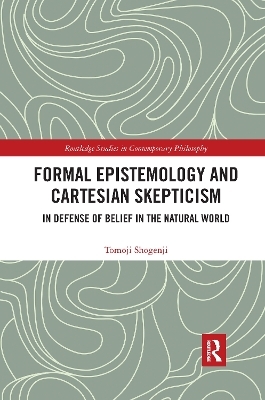
Formal Epistemology and Cartesian Skepticism
In Defense of Belief in the Natural World
Seiten
2020
Routledge (Verlag)
978-0-367-59395-7 (ISBN)
Routledge (Verlag)
978-0-367-59395-7 (ISBN)
This book introduces two formats of epistemic evaluation of intereest to epistemologists/philosophers of science: the dual-component format, which evaluates a statement on the basis of its safety and informativeness, and the relative-divergence format, which evaluates a probabilistic model on the basis of its complexity and goodness of fit with
This book develops new techniques in formal epistemology and applies them to the challenge of Cartesian skepticism. It introduces two formats of epistemic evaluation that should be of interest to epistemologists and philosophers of science: the dual-component format, which evaluates a statement on the basis of its safety and informativeness, and the relative-divergence format, which evaluates a probabilistic model on the basis of its complexity and goodness of fit with data. Tomoji Shogenji shows that the former lends support to Cartesian skepticism, but the latter allows us to defeat Cartesian skepticism. Along the way, Shogenji addresses a number of related issues in epistemology and philosophy of science, including epistemic circularity, epistemic closure, and inductive skepticism.
This book develops new techniques in formal epistemology and applies them to the challenge of Cartesian skepticism. It introduces two formats of epistemic evaluation that should be of interest to epistemologists and philosophers of science: the dual-component format, which evaluates a statement on the basis of its safety and informativeness, and the relative-divergence format, which evaluates a probabilistic model on the basis of its complexity and goodness of fit with data. Tomoji Shogenji shows that the former lends support to Cartesian skepticism, but the latter allows us to defeat Cartesian skepticism. Along the way, Shogenji addresses a number of related issues in epistemology and philosophy of science, including epistemic circularity, epistemic closure, and inductive skepticism.
Tomoji Shogenji teaches philosophy at Rhode Island College. His main area of research is formal epistemology, and his publications include "Is coherence truth conducive?" (Analysis 1999) and "The Degree of epistemic justification and the conjunction fallacy" (Synthese 2012) among many others.
Introduction
1. Skepticism and the Method of Meliorative Epistemology
2. Truth as Correspondence
3.The Myth of Epistemic Circularity
4. Dual Components of Epistemic Evaluation
5. A Bayesian Case for Skepticism
6. Divergences from the Truth
7. Cartesian Skepticism Defeated
| Erscheinungsdatum | 01.07.2020 |
|---|---|
| Reihe/Serie | Routledge Studies in Contemporary Philosophy |
| Verlagsort | London |
| Sprache | englisch |
| Maße | 152 x 229 mm |
| Gewicht | 453 g |
| Themenwelt | Geisteswissenschaften ► Philosophie ► Erkenntnistheorie / Wissenschaftstheorie |
| Geisteswissenschaften ► Philosophie ► Logik | |
| Mathematik / Informatik ► Mathematik | |
| Naturwissenschaften | |
| ISBN-10 | 0-367-59395-5 / 0367593955 |
| ISBN-13 | 978-0-367-59395-7 / 9780367593957 |
| Zustand | Neuware |
| Informationen gemäß Produktsicherheitsverordnung (GPSR) | |
| Haben Sie eine Frage zum Produkt? |
Mehr entdecken
aus dem Bereich
aus dem Bereich
die Grundlegung der modernen Philosophie
Buch | Softcover (2023)
C.H.Beck (Verlag)
CHF 25,20
Buch | Softcover (2023)
Reclam, Philipp (Verlag)
CHF 9,80

![Was heißt Denken?. Vorlesung Wintersemester 1951/52. [Was bedeutet das alles?] - Martin Heidegger](/media/113619842)
